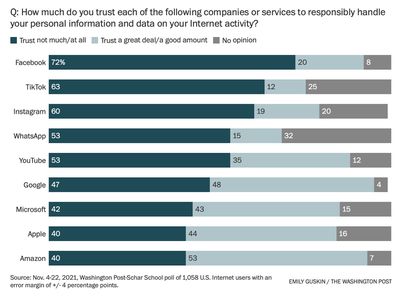According to a new survey, more users trust Amazon and Google to handle their personal user data and internet browsing activity than Apple, while users overwhelmingly distrust Facebook, TikTok, and Instagram.

The survey conducted by The Washington Post sampled over 1,000 internet users in the U.S. about how much they trust Facebook, TikTok, Instagram, WhatsApp, YouTube, Google, Microsoft, Apple, and Amazon to "responsibly" handle their user data and browsing activity.
Users were polled on whether they trust the companies and platforms "a great deal," "a good amount," "not much," or "not at all," with users also able to state they had no opinion of a given company.
Among respondents, 18% said they trust Apple "a great deal," while Google and Amazon scored 14%. But in the "a good amount" category, Amazon took the lead with 39%, Google with 34%, and Apple trailing with 26%. Combining the two positive categories, Apple's overall net positive score was 44%, lagging behind Google's 48% and Amazon's 53%.

On the negative side, survey data indicated that out of Amazon, Apple, Google, and Microsoft, 40% of those surveyed said they don't trust Facebook at all to handle their user data. Facebook took the crown for being the least trustworthy out of all those listed. A separate survey last week revealed a similar sentiment amongst users, naming Facebook, now known as Meta, as the worst company of 2021.
Apple tied Amazon for the best net negative score at 40%, with Microsoft coming in at 42% and Google at 47%.
Internet users were also asked about targeted online advertising, with 82% saying they find targeted online ads annoying, 74% finding them invasive, and only 27% finding them helpful. One of Apple's most controversial and talked-about privacy measures introduced in recent years is App Tracking Transparency, which indirectly aims to limit the annoying and invasive ads seemingly disliked by most users.
App Tracking Transparency (ATT) requires apps to ask for users' consent before tracking them across other apps and websites. For users opted out of the tracking, apps and data brokers such as Facebook have fewer data points to show users targeted advertising online. Facebook has lobbied against ATT, calling it harmful to small businesses that rely on ads to keep afloat.























